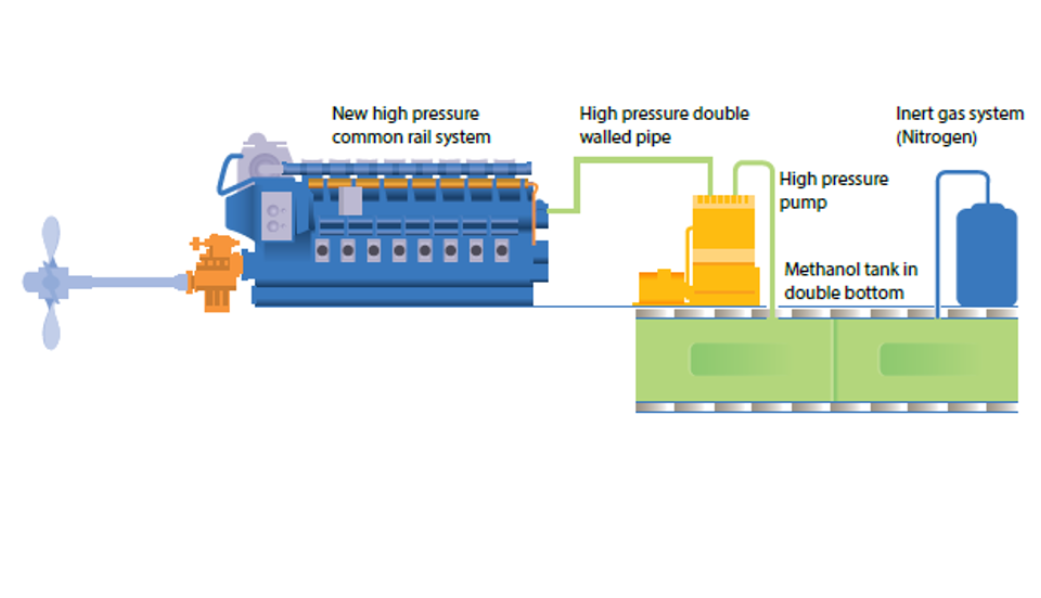- Position:
- 2nd engineer
New approaches to fire safety for gas-fueled ships

Recently, there has been an increasing demand in the world for sea vessels using liquefied gas - methanol - as fuel. The reason for this is both the financial benefits of switching to it and the reduction in carbon emissions compared to heating oil/diesel. The latter factor is becoming increasingly important as part of the long-term goals of achieving carbon neutrality and combating climate change.
At the same time, an analysis of existing methods for ensuring fire safety on sea vessels indicates the need for their modification, taking into account the emergence of a new category of vessels. First of all, this concerns methods of fighting fires in the area of methanol tanks.
Survitec specialists have carried out comprehensive fire tests to combat fires in engine rooms for ships with bi-fuel main engines capable of running on both methanol and diesel fuel. The results obtained showed that currently existing fire fighting techniques for classic marine engines demonstrate low efficiency when switching to liquefied gas.
Representatives of the Survitec company note that methanol marine fuel has different characteristics compared to diesel fuel, so fires involving it are characterized by increased aggressiveness. Traditional water mist systems are unable to suppress fire, either when fires occur directly in fuel tanks or when gas is sprayed into the air, for example, inside the engine room of a ship.
The combustion of methanol requires the presence of a special set of physicochemical properties, therefore, rapid extinguishing of the combustion source is impossible, and to successfully fight the fire it is necessary to use various fire extinguishing techniques.
Methanol or methyl alcohol has a low combustion temperature (about 12 degrees). Survitec representatives, based on field tests, have established that water mist systems absorb a significant portion of thermal energy and displace oxygen, complicating combustion processes, but are fully effective when burning diesel fuel. In the event of an alcohol fire, the effectiveness of such fire extinguishing systems is noticeably reduced.
Representatives of the company note that methanol marine fuel is becoming increasingly widespread in shipping practice, the number of ships with similar power plants is increasing, which leads to an increase in the risk of fires on board. The lack of up-to-date fire safety protocols reduces the effectiveness of fire fighting and can lead to negative consequences.
The transition to methanol is really becoming a trend; for example, one of the world's largest container companies, Maersk, has planned to convert one of its container ships to gas fuel. Studies have shown that in order to install gas tanks and switch the main engine to a new fuel, it will be necessary to completely change the standard fire extinguishing system.
Studies have shown that in order to ensure the necessary effectiveness of fire fighting, it is necessary to reconsider many parameters, for example, spray nozzles must be moved significantly lower than in fire extinguishing systems of diesel engines. The use of a standard height does not allow fighting fire in methanol tanks in conditions of limited hold space. Other changes are also needed.
Survitec notes that today there are clear standards and regulations for fire safety systems for diesel fuel, while for gas fuel, which appeared relatively recently, such standards have yet to be developed. Methanol and ethanol are high-risk fuels, so this work must be carried out as soon as possible. They propose to pay attention to this aspect, both ship owners and regulatory authorities at the national and international level. Only in this case will it be possible to avoid the loss of people and ships.
- Position:
- Chief engineer
- Position:
- Electrician engineer
- Position:
- 2nd engineer
- Position:
- Electrician engineer
